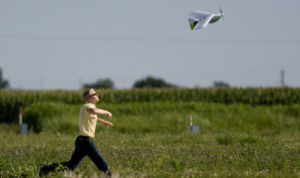from herald-review.com

While the use of UAVs, which are commonly referred to as drones, can be controversial, New York attorney Brendan Schulman said the equipment can be useful, particularly for agriculture. Other beneficial applications include search-and-rescue operations, he said.
Until the Federal Aviation Administration issues more clear rules for flying UAVs, Schulman said operators could face up to $10,000 fines for violating current guidelines. The FAA is trying to maintain safety in the air from the ground up, he said.
The FAA is relying on a 1981 advisory note to say drones can’t be flown more than 400 feet in the air, Schulman said. The agency didn’t enforce its regulations until 2007 when Schulman said it began to realize the interest in UAVs was increasing.
“The FAA regulation says landowners don’t have any jurisdiction over their land,” said Schulman, the head of an unmanned aerial system law group. “That seems like a contradiction to what the Supreme Court ruled.”
Schulman said a 1946 U.S. Supreme Court ruling gave above ground property rights to landowners, with an exception for navigable air space in the public domain at a minimum safe altitude.
Schulman spoke during the Precision Aerial Ag Show, which was held Wednesday and Thursday at Progress City in Decatur, which hosts the Farm Progress Show every other year. Decatur-based AgEngage organized the event, which was held for the first time to provide information about the technology and demonstrate what can be done with it.
Penton Farm Progress Co. helped to market the event, which made use of Progress City with the Farm Progress Show in Boone, Iowa this year.
The drone technology is ready to take off, particularly in agriculture, but the future remains shaky until the FAA defines the rules as it is mandated by Congress to do by 2015, Schulman said.
The technology has been called into question over concerns about privacy rights and law enforcement use, he said. Some states have made use of drones for surveillance purposes illegal, Schulman said.
Continue Reading at herald-review.com…
Alan is serial entrepreneur, active angel investor, and a drone enthusiast. He co-founded DRONELIFE.com to address the emerging commercial market for drones and drone technology. Prior to DRONELIFE.com, Alan co-founded Where.com, ThinkingScreen Media, and Nurse.com. Recently, Alan has co-founded Crowditz.com, a leader in Equity Crowdfunding Data, Analytics, and Insights. Alan can be reached at alan(at)dronelife.com
